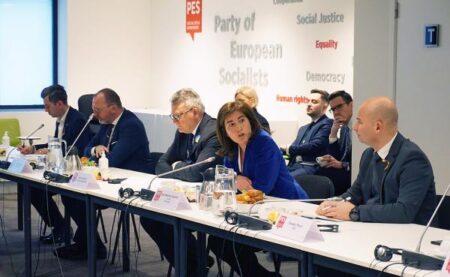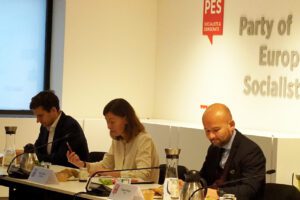From jobs and social support for Ukrainian refugees, to fair wages and fair platform work, as well as support to households and the economy in the face of rising energy costs, solidarity is our red thread, ministers agreed today.
This morning, ministers, state secretaries, European Commissioner for Jobs and Social Rights Nicolas Schmit, and MEPS from the Party of European Socialists met in Brussels to discuss important items on the agenda of the EPSCO Council.
Meeting Chair, Portuguese Minister for Labour, Solidarity and Social Security Ana Mendes Godinho, said:
“Russia’s unjustifiable invasion of Ukraine means two million people are now on the road to and in the EU. We must do our best to welcome them, including from an employment and social affairs perspective.
“Solidarity was at the heart of our response to the coronavirus pandemic. Now it is at the heart of our response to those fleeing the war in Ukraine. We will support refugees arriving in our Member States, we will help Ukrainian children out of their dramatic situation. We have a solidarity duty towards them, now and in the future. We will also support workers, companies and households impacted by the conflict in Ukraine.
“As socialists, we are working to make sure this solidarity is just as present elsewhere. From fair wages for all in the EU, to the rights of platform workers, solidarity must be the common thread running through all EU policies.”
The meeting welcomed progress on the Directive on Adequate Minimum Wages in the EU – an important initiative from PES European Commissioner Nicolas Schmit to implement the European Pillar of Social Rights and the Porto Declaration. Participants called for the quick delivery of a Directive that ensures decent minimum wages in member states with statutory minimum wages and strong collective bargaining across Europe.
Another key proposal from Commissioner Schmit was also welcomed at the meeting – the Directive on Improving Working Conditions in Platform Work. Although discussions on this new EU legislation is at the early stages, socialists in member state governments have already taken action at the national level, including in Italy Spain, Portugal and Belgium. The proposed Directive is another sign that the Social Europe the PES promotes is advancing – if implemented, the Directive will improve the situation of 28 million platform workers across Europe.
Ministers and state secretaries also exchanged on social taxonomy, including how investors can be helped to identify socially sustainable economic activities, and how companies in the real economy can be incentivised to pursue socially sustainable activities.
The PES ESPCO welcomed three new participants: Minister Danielsson and State Secretary Landgren from Sweden, and State Secretary Vasilcoiu from Romania.
The meeting was attended by:
- Ana Mendes Godinho, Chair and Minister of Labour, Solidarity and Social Security, Portugal
- Nicolas Schmit, European Commissioner for Jobs and Social Rights, European Commission
- Ivan Krastev, Deputy Minister of Labour and Social Policy, Bulgaria
- Tuula Haatainen, Minister of Employment, Finland
- Rolf Schmachtenberg, State Secretary at the Federal Ministry of Labour and Social Affairs, Germany
- Andrea Orlando, Minister of Labour and Social Policies, Italy
- Georges Engel, Minister of Labour, Employment and the Social and Solidarity Economy, Luxemburg
- Madalin-Cristian Vasilcoiu, State Secretary to the Minister for Labour and Solidarity Protection, Romania
- Johan Danielsson, Minister for Housing and Deputy Minister for Employment, Sweden
- Mattias Landgren, State Secretary to the Minister for Housing and Deputy Minister for Employment Johan Danielsson, Sweden
- Agnes Jongerius, EMPL Coordinator, S&D Group in the European Parliament Chair of PES Social Europe Network
- Luca Visentini, General Secretary, ETUC
- Liina Carr, Confederal Secretary, ETUC
- Yonnec Polet, Deputy Secretary General, PES



